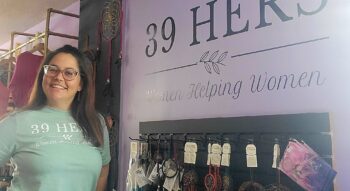Educators at Niagara College and Brock University are harnessing the power of virtual reality (VR) to help students tap into the lived experiences of people with disabilities on post-secondary campuses.
The unique collaboration called IT'S AN IDEA (Inclusion, Diversity, Equity and Accessibility) Learning to Foster Authentic Inclusion for Accessibility Through VR Simulations was developed by a team of Niagara-area educators and funded by a $105,000 grant from the Virtual Learning Strategy. The grant is an eCampusOntario-led initiative funded by the Ministry of Colleges and Universities.
In the fall of 2023, the VR simulations - four in total - will be part of an interdisciplinary NC course on Equity, Diversity, Inclusion and Decolonization taken by students in over 30 programs, as well as in Brock's Accessibility Consultant Micro-Credential.
The VR simulations were developed and tested by NC professors Theresa Anzovino and Jamie Oresar, Adaptive Technology Specialist Jim McEwen, and Brock University's Dr. Maureen Connolly, Director of the Brock-Niagara Centre of Excellence in Inclusive and Adaptive Physical Activity (CAPA), to give students a window into the lives of people with disabilities, to raise awareness about ableist interactions, and to learn about appropriate responses and strategies for challenging ableism.

Niagara College professor Jamie Oresar piloted the VR accessibility simulation (IT'S AN IDEA - inclusion, diversity, equity and accessibility) to students in NC's Equity, Diversity and Inclusion General Education elective course.
“This project presented a unique opportunity for collaboration between NC’s Academic and Liberal Studies, NC’s Health, Wellness and Accessibility Services (HWAS) and Brock’s CAPA Research Centre," said Anzovino.
"The project aligns with the vision and guiding principles of NC’s Equity, Diversity and Inclusion (EDI) Blueprint with a focus on authentic inclusion and accessibility," said McEwen. "As NC employees with disabilities, it was important to us that the simulations be centered on authentic lived experiences of the disability community. Using the power of immersive VR, for a moment, you are able to get a firsthand glimpse of how ableism, microaggressions, and systemic obstacles can affect people with disabilities."
"My NC partners and members of the CAPA Community Advisory Council and I were committed to authentic consultation on the scenarios that we developed and to piloting the scenarios with disability community members," said Dr. Connolly. "This is a wonderful example of what can happen when a project is informed by principles of disability justice.”
Donning Oculus Quest II VR headsets with handheld controls (or accessible via a PC version) students can enter an immersive experience in perspective-taking. The simulations allow learners to engage with characters from different backgrounds and scenarios on post-secondary campuses that focus on a range of barriers including physical, architectural and attitudinal. Learners make choices on how to engage from a series of prompts to learn about ableism.
In the first sim, a student has experienced a concussion, and players advise them as a peer on how to work through recovery and a return-to-learn plan. In the second, players take the role of a professor and meet with a student requesting a letter of accommodation. In the third sim, a student with low vision who uses a mobility aid comes to the parking office to discuss their concerns. The final sim challenges assumptions about wheelchair usage, as players assume the role of a security staff member, engaging with a student who is the subject of a formal complaint.
The simulations were programmed by Niagara Falls e-learning company Xpert VR and tested by Brock University's CAPA Community Advisory Council and members of different disability communities, as well as Niagara College's Centre for Academic Excellence, Centre for Organizational Excellence, and HWAS.
"In today’s world, it is essential to work on projects that promote equity, diversity, inclusion and accessibility," said Evan Sitler, CEO and Co-Founder of Xpert VR. "It was a breath of fresh air to collaborate with a team that shares our vision of making education accessible, engaging, and impactful for everyone. We were particularly thrilled to develop virtual reality (VR) accessibility tools for the “It’s An IDEA” simulation, as it gave us a glimpse into the future of accessibility. Our aim is for this project to have a substantial impact on Ontario institutions and eventually extend to other institutions and people worldwide."
NC's Oresar and McEwen - with support from part-time Sociology professor Krystine Donato - piloted the simulation to a group of 10 students from the College's Equity, Diversity and Inclusion General Education elective.
"As a person with a disability, the simulations are accurate and respectful and what I would want people to see," said Donato. "You can't really know how the person feels or what they experience, but you can listen."
At the pilot, the Dental Hygiene students had many lightbulb moments, tying the experience to their future careers in health care engaging with a diverse public with varying levels of abilities and needs.
The project aligns with the Accessibility for Ontarians with Disabilities Act (AODA) goal for the province to be accessible by the year 2025. As an open source, this digital content project has sector-wide relevance in its ability to help post-secondary institutions build accessibility into programs of study and training. It is housed in eCampus Ontario's VLS Collection for anyone to use through an Ontario Commons License or a Creative Commons license. The simulation also links users to NC's Accessibility Hub which launched in spring 2022.
"The next 18 months is really important to bring people up to speed on the AODA requirements," said Connolly. “Architectural change is expensive but relatively simple. Attitudinal change may be the hardest of all, and it is why we designed the scenarios the way we did."
The total project cost approximately $150,000 and includes in-kind contributions from all project partners. It benefited from the support and leadership of Catherine Brigantino, Experiential Education Co-ordinator with Brock University's Co-op, Career, and Experiential Education team; Natasha Patrito Hannon, formerly of Niagara College Centre for Academic Excellence; Qi (Chee) Wan, recent graduate of Brock University's Master of Applied Disabilities Studies program; David Atherton, Dean of Academic and Liberal Studies; and James Butko, Associate Dean of Liberal Studies.
Niagara College has a full-time enrolment of more than 10,000 students from over 95 countries, who study in 130 diploma, certificate and bachelor degree programs at specialized campuses in Welland and Niagara-on-the-Lake. Niagara College is also involved in educational projects and partnerships around the world and is consistently ranked among Canada's top 10 colleges for research funding. Learn more at niagaracollege.ca
Brock University is a comprehensive institution with rich academic programs and world-class research activity. Located in Ontario's scenic Niagara region on the traditional territory of the Haudenosaunee and Anishinaabe peoples, Brock is situated in a UNESCO Biosphere Reserve. With about 600 full-time faculty members and researchers, Brock’s robust academic scope offers more than 90 undergraduate programs and 50 graduate programs in seven dynamic Faculties. The University's 19,000 students come from across Canada and around the world. Brock's renowned student experience is enriched by an emphasis on experiential education, as illustrated by community partnerships, volunteerism and one of Ontario’s largest and most successful co-op programs. Learn more at brocku.ca
-30-
Media inquiries, please contact:
Jessica Torok
Communications Consultant
Niagara College
905-932-1520
[email protected]
Maryanne St. Denis
Manager, Content and Communications
Brock University
905-246-0256
[email protected]
Evan Sitler
CEO and Co-Founder
Xpert VR
519-741-7778
[email protected]



